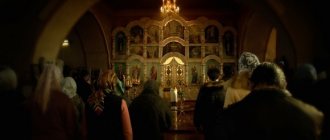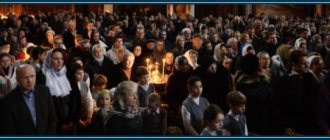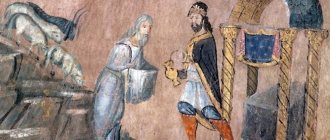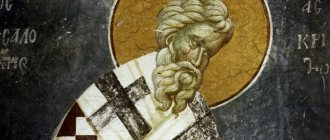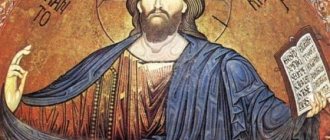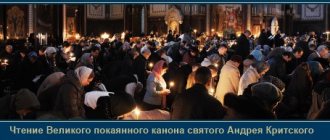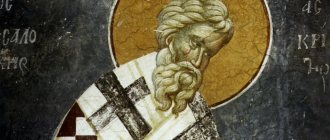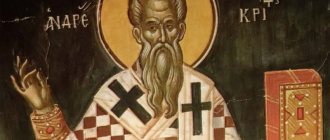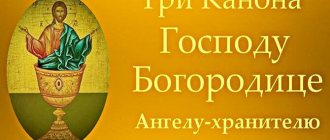The Great Penitential Canon of Andrew of Crete is read in the first four days of Great Lent, one part at a time. The entire creation is read in the seventh week. The canon teaches people to repent. Accept your sins and learn to fight them. This scripture also instructs us to follow the example of pure and selfless people.
About Andrey Kritsky
The Monk Andrew was born sometime in the 660s AD, in the city of Damascus. Legends say that until the age of seven the child could not speak. Andrei's parents were believers and often attended church. One day, during communion, God’s blessing came upon Kritsky and he spoke. After this miracle, Andrei's parents sent him to study the basics of religion.
When the guy turned 14 years old, he was transferred to serve in Jerusalem, to the Monastery of the Holy Sepulchre. Andrey was a very versatile young man, so he was immediately identified as a notary.
Then Andrei moved to Constantinople, where he served in an orphanage as a deacon for 20 years. In the same city, he began to write his chants, which are still widely used in the Orthodox Church to this day.
After this, the future saint was sent to the island of Crete as a bishop. There he faithfully served the church, guiding heretics to the true path and giving support to believers. Andrei built several orphanages and churches in Crete. For his faithful service he received the rank of archbishop. In 1740, the monk died on his way from Constantinople to the island of Crete.
Song 6
Irmos: I cried out with all my heart to the generous God, and heard me from hell, and raised my life from aphids.
[With all my heart I cried out to the merciful God, and He heard me from the underworld and called my life from destruction.]
I bring tears, O Savior, to my eyes, and from the depths of my sighing, I cry to my heart: God, cleanse me from my sins.
[I sincerely offer You, Savior, the tears of my eyes and sighs from the depths of my heart, crying: God, I have sinned before You, have mercy on me.]
You, my soul, have strayed from your Lord, like Dathan and Aviron, but have mercy, call from hell, so that the earthly abyss will not cover you.
[You, soul, have turned away from your Lord, like Dathan and Abiron, but call from the underworld: have mercy, so that the earthly abyss does not swallow you up.] (Num. 16:32)
Like a young girl, your soul, enraged, you became like Ephraim, like a chamois, keeping your life from the snares, having fixed your mind and sight in action.
[Having become furious like a heifer, you, soul, have become like Ephraim, but like a roe save your life from snares, inspiring your mind with activity and contemplation.] (Jer. 31:18. Hos. 10:11)
May the hand of Moses assure us, O soul, that God can whiten and cleanse the life of a leper, and do not despair of yourself, even though you are a leper.
[Let the hand of Moses convince us, O soul, how God can whiten and cleanse the leprous life, and do not despair for yourself, although you are stricken with leprosy.] (Ex. 4:6-7)
Glory, Trinity: The Trinity is simple, indivisible, separate and personal, and the Unit is united by Nature, the Father speaks, and the Son, and the Divine Spirit.
[I am a non-composite Trinity, inseparable, separate in persons, and a Unit united in essence; Father, Son and Divine Spirit testify.]
And now, the Mother of God: Thy womb of God gave birth to us, imagined after us, Him, as the Creator of all, pray, Mother of God, that through Thy prayers we may be justified.
[Thy womb gave birth to us God, who took our image; Pray to Him, as the Creator of the whole world, Mother of God, so that through Your prayers we may be justified.]
Lord have mercy. (three times). Glory, even now.
Kontakion, tone 6:
My soul, my soul, arise, why are you sleeping? The end is approaching, and the imashi will be embarrassed; Arise, O God, may Christ God, who is everywhere and fulfills all things, have mercy on you.
[My soul, my soul, arise, why are you sleeping? The end is approaching and you will be confused; Awake, so that Christ God, Omnipresent and filling everything, will have mercy on you.]
About the canons
Andrei Kritsky was the first to write canons instead of kontakions. The saint has hymns for all major holidays: Christmas, Easter, Palm Sunday and others. Many of them are also used in modern liturgical menaia. The canons are closely related to the "biblical songs". The structure of this chant is as follows. First comes the irmos, which is the connecting chain between the biblical song and the content of the canon. Next come the troparia. They are sung alternately with songs. The most outstanding creation, undoubtedly, is the great canon of St. Andrew of Crete. He teaches us repentance. It is best to ask for forgiveness from the Lord during Lent, when the canon of St. Andrew of Crete is read.
Song 2
In the second song, the great canon of Andrei Kritsky talks about how we all succumbed to carnal consolation. First, they pulled on their clothes, ashamed of their naked body, which was created in the likeness of the Lord. Secondly, they prioritized pleasure and beauty of the body, not the soul. Even in this song of the great canon of Andrei Kritsky it is said that we are subject to all earthly passions and, unfortunately, we do not want to fight them. For all these sins we must sincerely ask God to forgive us. The main thing is to understand your bad deeds yourself and strive to get rid of them.
Song 1
Irmos: Helper and protector be my salvation, This is my God, and I will glorify Him, God of my father, and exalt Him: gloriously thou art glorified.
[The Helper and Protector has appeared to me for salvation, He is my God, and I will glorify Him, the God of my father, and I will praise Him, for He is exalted in glory. – Translation by N.I. Cedar] (Exodus 15:1–2)
Chorus: Have mercy on me, God, have mercy on me.
Where will I begin to cry about my damned life and deeds? Shall I make a beginning, O Christ, for this present mourning? But as you are kind, grant me forgiveness of sins.
[Where should I begin to mourn the deeds of my ill-fated life? What beginning will I make, O Christ, for my present lamentation? But You, being merciful, grant me forgiveness of sins.]
Come, wretched soul, with your flesh, confess to the Creator of all, and remain the rest of your former speechlessness, and bring tears to God in repentance.
[Come, unfortunate soul, with your flesh, confess to the Creator of all, finally refrain from your former recklessness and bring tears to God with repentance.]
I was jealous of the primordial Adam’s crime, I knew myself to be naked from God and the ever-present Kingdom and sweetness, a sin for my sake.
[By imitating the primeval Adam in crime, I recognize myself as deprived of God, the eternal Kingdom and blessedness for my sins.] (Gen. 3:6–7)
Woe to me, wretched soul, that you have become like the first Eve? You saw the evil, and you were wounded by the mountaineer, and you touched the tree and you tasted the insolently wordless food.
[Woe is me, my unfortunate soul, why have you become like the first-created Eve? You did not look kindly and were cruelly wounded, you touched the tree and boldly tasted the meaningless fruit.] (Gen. 3:6)
Instead of Eve, my sensual thought was Eve, a passionate thought in the flesh, showing sweetness and tasting the ever-bitter drink.
[Instead of the sensual Eve, a mental Eve arose in me - a carnal, passionate thought, seducing with pleasant things, but when tasted, it always fills us with bitterness.]
Worthy was he expelled from Eden, because he did not preserve Thy one commandment, O Savior, Adam: why shall I suffer, the living creature always rejecting Thy words?
[Adam was worthily expelled from Eden, as he did not keep one of Your commandments, Savior. What must I endure, who always reject Your life-giving commandments?] (Gen. 3:23)
Glory, Trinity: Pre-existent Trinity, worshiped in Unity, take away from me the heavy burden of sin, and as you are gracious, give me tears of compunction.
[Most-essential Trinity, Whom we worship in one Being, remove from me the heavy burden of sin and, in Your mercy, grant me tears of tenderness.]
And now, Mother of God: Mother of God, to the hope and intercession of those who sing to You, take away from me the heavy sinful burden, and as the Pure Lady, repentantly accept me.
[Mother of God, hope and protection of those who sing Your praises, remove from me the heavy burden of sin and, like the Pure Lady, accept me repentant.]
Song 3
In it, the great penitential canon of Andrew of Crete tells how the Lord could not stand the outrage that was happening in Sodom and burned the city. Only one righteous man, Lot, managed to escape. Andrei calls on every person to renounce the pleasures of Sodom and quickly run away. The sins of this city haunt us every day, tempting us to repeat them, I think many succumb. But the main thing is to stop and think about what awaits us in the future. What kind of afterlife will we have after the entertainments of Sodom?
Song 8
Irmos: Whom the armies of Heaven praise, and the Cherubim and Seraphim tremble, every breath and creature, sing, bless and exalt to all ages.
[Whom the armies of heaven glorify and before whom Cherubim and Seraphim tremble, Him, all beings and creatures, sing, bless and extol in all ages.]
Having sinned, O Savior, have mercy, raise my mind to conversion, accept me, who repent, and show mercy when I cry: You who have sinned, save me, those who have sinned, have mercy on me.
[Have mercy on me, a sinner, Savior, awaken my mind to conversion, accept the repentant, have mercy on those who cry: I have sinned before You, save me; I lived in iniquity, have mercy on me.]
The charioteer Elijah, who entered the chariot of virtues, as if into heaven, sometimes carrying more than earthly things, therefore my soul contemplates the ascent.
[Elijah, carried on a chariot, having mounted the chariot of virtues, once ascended as if into heaven, above all earthly things; think, my soul, about his rising.] (2 Kings 2:11)
Elisha sometimes receives mercy from Elisha and receives special grace from God; But you, O my soul, have not received communion of grace for intemperance.
[Once Elisha, having accepted the mantle (cloak) of Elijah, received deep grace from the Lord; but you, my soul, did not receive this grace for intemperance.] (2 Kings 2:9, 13–13)
The stream of the Jordan flowed first, with the mercy of Elisha, Elisha, a hundred here and here; But you, O my soul, have not received communion of grace for intemperance.
[Elisha once divided the stream of the Jordan into one side and the other through the mercy of Elijah; but you, my soul, did not receive this grace for intemperance.] (2 Kings 2:14)
Somanitida sometimes establishes the righteous, about the soul, good morals; You didn’t bring you into the house, neither a stranger nor a traveler. Meanwhile, the palace burst out, sobbing.
[The Shunammite woman once entertained the righteous man with good zeal; and you, soul, did not accept either a stranger or a stranger into your home; For this reason you will be cast out of the bridal chamber with mourning.] (2 Kings 4:8)
Gehazi imitated you, accursed mind, always evil, soul, whose love of money put aside until old age; Flee the fire of hell, having left your evil ones.
[You, wretched soul, have ceaselessly imitated Gehazi's unclean disposition; although in old age reject his love of money and, abandoning his atrocities, escape the fire of hell.] (2 Kings 5:20-27)
Glory, Trinity: Father without beginning, Son without origin, Good Comforter, Righteous Soul, Word of God to the Parent, Father without beginning to the Word, Living and Creator Soul, Trinity Unity, have mercy th me.
[Beginless Father, Co-originating Son, Good Comforter, Right Spirit, Parent of the Word of God, Beginningless Word of the Father, Life-Giving and Creating Spirit, One Trinity, have mercy on me.]
And now, the Mother of God: For from the turning of the scarlet, O most pure, intelligent scarlet of Immanuel, the flesh was consumed within in Thy womb; Moreover, we truly honor Theotokos.
[Mental purple - the flesh of Emmanuel was woven inside Your womb, Most Pure, as if from a purple substance; therefore we honor You, the True Mother of God.]
Songs read on Tuesday of Lent.
Song 1
It tells how Cain killed his brother out of jealousy. Andrei asks to live his life righteously, without thinking about who and what the Lord gave. If a person lives according to God’s commandments, then grace will soon come to him. We must strive to be like Abel, who with a pure soul brought his gifts to the Lord.
Song 2
Calls on people to repent of rejecting spiritual wealth and attaching importance only to material things. In the pursuit of clothes and other benefits, they completely forgot to pray to the Lord. We forget that a mentally rich person will be much happier.
Song 3
This song from the canon of Andrei of Crete calls for living like Noah, to whom alone the Lord gave a chance to be saved. Or like Lot, the only survivor of Sodom. Because if we sin, then the fate of the people in the flood will befall us.
Song 4
There is power in knowledge. You need to strive to see God in yourself, and a staircase to heaven will be built, like the patriarchs. In everyday life we imitate Esau, who hated everyone. We must live in love and harmony.
Song 5
Just as the entire Jewish people lived in Egyptian slavery, so our soul lives all the time in sin. We need to have the courage to end slavery. Even if at first we need to suffer, then in the end we will acquire true freedom of spirit. Then life will become much easier and more pleasant.
Song 6
Continues to talk about the adventures of Moses, who sought to lead the people out of Egyptian slavery. People do not have much faith to endure a little wandering in the name of a good goal. So we need everything at the same time. We need to believe in the Lord and ask for forgiveness, and then we can free our souls from the slavery of sins.
Song 7
The song of the great canon of St. Andrew of Crete tells how we repeat the sins and addictions of biblical characters, but do not have the strength and desire to follow the great martyrs. Our body indulges in sinful acts such as adultery without thinking about the consequences for the soul.
Song 8
The eighth song tells about people who were able to find the strength to repent and accept the Lord into their souls. So Andrei calls us to renounce our past sinful life and move towards God. At the end of the eighth song, the Old Testament is summed up - one must not repeat the sins of the biblical characters and strive to live like the righteous of this Holy Scripture.
Song 9
In the ninth song, the canon of St. Andrew of Crete gives comparisons from the New Testament. Just as Jesus resisted the temptation of Satan in the wilderness, so we must resist all temptations. Christ began to work miracles on earth, thereby showing that everything in this world is possible. The main thing is to believe and live according to the covenants of the Lord, and then our soul can be saved on the day of judgment.
Song 4
Irmos: The prophet heard Your coming, O Lord, and feared, because you wanted to be born of a virgin and appear as a man, and said: I heard Your hearing and feared, glory to Your power, Ho Godspeed.
[The prophet heard about Your coming, O Lord, and was afraid that You would be born of a Virgin and appear to people, and said: I heard the news about You and was afraid; glory to your power, O Lord.]
Do not despise Your works, do not forsake Your creation, Justice, even if only one has sinned, as a man, more loving than any other man, but also, as the Lord of all, has the power to forgive sins.
[Do not despise Your creations, do not forsake Your creation, O Righteous Judge, for although I, as a man, alone have sinned more than any man, You, Lover of mankind, as the Lord of the whole world, have the power to forgive sins.] (Matthew 9:6; Mark 2:10)
The end is approaching, soul, approaching, and carelessly, unprepared, time is shortening, arise, near at the door there is a Judge, like sleep, like color, the time of life is flowing, why are we in vain?
[The end is approaching, soul, approaching, and you do not care, you do not prepare; time is shortening - rise up: the Judge is already close - at the door; the time of life passes like a dream, like a color. Why do we fuss in vain?] (Matthew 24:33; Mark 13:29; Luke 21:31)
Arise, O my soul, thy deeds which thou hast done, meditate, and bring these before thy face, and shed forth drops of thy tears: speak with boldness the deeds and thoughts of Christ, and be justified.
[Awake, my soul, think about your deeds that you have done, bring them before your eyes, and shed drops of your tears, fearlessly reveal your deeds and thoughts to Christ and be justified.]
There was no sin in life, no deed, no malice, and I, O Savior, did not sin in mind and in word, and in will and suggestion, and in thought, and in deed, as no one else has ever sinned.
[There is no sin, no deed, no evil in life of which I would not be guilty, Savior, in mind, and in word, and in will, having sinned in intention, and in thought, and in deed, as no one else has ever done.]
From here I was condemned, from here I was condemned, damned from my own conscience, which is more necessary than anything else in the world. Judge, my Deliverer, and indeed, spare and deliver, and save me, Your servant.
[That is why I am accused, that is why I, unfortunate one, am condemned by my conscience, more severe than which there is nothing in the world; Judge, my Redeemer and Tester, have mercy, deliver and save me, Your servant.]
The ladder, from the ancient sight of the great Patriarchs, there is an indication, my soul, of an active ascent, a reasonable ascent, if you wish, by action, and by reason, and by sight, to renew ́sya.
[The ladder, which the great of the patriarchs saw in ancient times, serves as an indication, my soul, for ascension by deeds, to elevation in mind; therefore, if you want to live in activity and in understanding and contemplation, then be renewed.] (Gen. 28:13)
He endured the heat of the day for the sake of the Patriarch, and suffered the filth of the night, making provisions for every day, shepherding, toiling, working, and marrying two wives.
[The patriarch out of necessity endured the heat of the day and endured the cold of the night, shortening his time daily, tending his flocks, working and serving in order to get himself two wives.] (Gen. 31:7:40)
By two wives we mean action and understanding in sight, Leah is an action, like one with many children, and Rachel, the mind, like one who is laborious, for apart from labor, neither action nor vision of the soul will be corrected.
[By two wives understand activity and understanding in contemplation: by Leah, as having many children, activity, and by Rachel, as gained through many labors, understanding, for without labor, the soul, neither activity, nor contemplation are improved.]
Glory, Trinity: Inseparable Being, unfused Persons, I theologize Thee, the One Trinity Divinity, as the one-royal and co-throne, I cry out to Thee a great song, tremblingly hymned in the highest.
[Undivided in essence, unmerged in Persons, I theologically confess You, Trinity One Deity, Co-Royal and Co-Throne; I proclaim to You a great song, sung three times in the heavenly mansions.] (Is. 6:1-3)
And now, the Mother of God: And you bear fruit and are virgins, and remain in both the nature of the Virgin: Being born renews the laws of nature, but the womb gives birth without giving birth. Whatever God wants, the order of nature is overcome, and He creates whatever He wants.
[And You give birth and remain a Virgin, in both cases preserving virginity by nature. He who is born of You renews the law of nature, and gives birth to the virgin womb; when God wills, the order of nature is disrupted, for He creates what He wants.]
Wednesday
On Wednesday, 9 songs are also read. Since the first days of the creation of the world, there have been people who glorified the Lord our God with their deeds. Andrew calls on people to repent of their sins and become like those saints in everyday life. Glorify the name of the Lord by doing deeds worthy of him. The songs also recall great sinners who turned away from God, gave priority to material goods, or succumbed to the temptation to try the forbidden fruit. The Lord punished them as they deserved for their deeds. Likewise, after death, our soul awaits the day of judgment, on which we will not be able to lie, we will not be able to hide our atrocities with some imaginary excuses. Therefore, Andrei calls us to repent during our lifetime, ask the Lord for forgiveness of sins and strive to change our actions for the better. Learn to resist temptations. There's nothing complicated about it. Just by remaining human, you will see that most of the Lord’s covenants indicate to live without envy and gluttony, without betrayal and the desire to receive someone else’s.
Song 7
Irmos: A sinner, a transgressor, an untruthful person before You, a lower observant, a lower co-creator, as You commanded us; but do not betray us to the end, Father God.
[We have sinned, we have lived lawlessly, we have acted unjustly before You, we have not kept, we have not fulfilled what You commanded us; but do not forsake us to the end, O God of the fathers.] (Dan.9:5–6)
I have sinned, lawlessly, and rejected Your commandment, as I committed sins and applied scabs to my own wounds, but have mercy on me, for I am the Compassionate One of the Fathers.
[I have sinned, lived in iniquity and violated Your commandment, for I was born in sins and added wounds to my wounds, but You Yourself have mercy on me, like the Merciful God of the fathers.]
The secret of my heart is confessed to You, my Judge, see my humility, see my sorrow, and hear my judgment today, and have mercy on me, as the Compassionate God of the Fathers.
[I have revealed the secrets of my heart before You, my Judge; look at my humility, look at my sorrow, pay attention to my condemnation now and have mercy on me, as the Merciful, God of the fathers.] (Ps. 37:13; 24:18; 34:23)
Saul sometimes, as if he had destroyed his father, the soul, the donkey, will suddenly gain the kingdom to serve, but beware, do not forget to yourself, your bestial lusts are more than the Kingdom of Christ.
[Saul, having once lost his father’s donkeys, unexpectedly received the kingdom with news of them; soul, do not forget yourself, preferring your bestial aspirations to the Kingdom of Christ.] (1 Samuel 9:1-27; 10:1)
David, sometimes the Father of God, even if I sinned deeply, my soul, was shot by an arrow from adultery, and was captured by a spear from murder by languor, but you yourself suffer from the most serious deeds, with self-indulgent aspirations nmi.
[If Godfather David once sinned doubly, being wounded by the arrow of adultery, he was struck down by the spear of vengeance for murder; but you yourself, my soul, suffer more grievously than through these deeds and arbitrary aspirations.] (2 Samuel 11:14-15)
David sometimes combined iniquity with iniquity: having dissolved fornication by murder, repentance showed abiye, but you yourself, most crafty soul, did it without repenting to God.
[David once added lawlessness to lawlessness, for he combined adultery with murder, but he soon brought intense repentance, but you, the most insidious soul, having committed greater sins, did not repent before God.]
David sometimes imagines, having copied a song on an icon, and denounces the act of doing it, calling out: have mercy on me. For you, the only one who has sinned, God, cleanse me yourself.
[David once, depicting as if in a picture, inscribed a song with which he denounces the offense he had committed, crying out: have mercy on me, for I have sinned before You, the One, the God of all; Cleanse me yourself.] (Ps. 50:3–6)
Glory, Trinity: The Trinity is simple, indivisible, consubstantial, and the Nature is one, Light, and Light, and Holy three, and one Holy is sung to God the Trinity, but sing, glorify, Life and Life, soul, all God.
[The Trinity is simple, indivisible, consubstantial, and one Divinity, Lights and Light, three Holy Ones and one Holy Person, God the Trinity, sung in chants; sing also, O soul, glorify Life and Lives - the God of all.]
And now, the Mother of God: We sing to Thee, let us bless Thee, we worship Thee, the Mother of God, for Thou hast given birth to the indivisible Trinity, the one Christ God, and Thou hast Herself revealed to us who are on earth the heavenly One.
[We praise You, bless You, worship You, Mother of God, for You gave birth to One of the Indivisible Trinity, Christ God, and You Yourself opened the heavenly abodes for us living on earth.]
Thursday
On this day of Great Lent, the last part of the canon is read. As in previous songs, virtues are sung here and the sins of mankind that have been committed over the centuries are condemned. Also in this part they appeal to the Lord, Jesus, and the Virgin Mary with a request to forgive sins and give them the opportunity to repent.
Also, the canon of St. Andrew of Crete teaches to admit one’s mistakes and not to look for blame for a bad life in others. Accept your sinfulness as a proven fact. But that doesn't mean you should put up with it. On the contrary, admitting guilt is the first step towards forgiveness. If we stop now, we have a chance of eternal life after death.
It is when the canon of St. Andrew of Crete is read, during Great Lent, that we have the opportunity to realize our sins and begin a new life. A life that will please God. Then humanity will be able to feel grace, peace and await the day of judgment with a calm soul.
Song 5
Irmos: From the morning night, O Lover of mankind, enlighten, I pray, and guide me in Thy commandments, and teach me, O Savior, to do Thy will.
[From the waking night, enlighten me, I pray, O Lover of Mankind, guide me in Your commandments and teach me, O Savior, to do Your will.] (Ps. 62:2; 119:35)
In the night my life passed away, for the darkness was fast and deep for me, the night of sin, but like the day of the son, Savior, show me.
[I constantly spent my life in the night, for the night of sin was darkness and deep darkness for me; but show me the son of the day, O Savior.] (Eph. 5:8)
Reuben, imitating the accursed Az, committed lawless and lawless counsel against the Most High God, desecrating my bed, like his father.
[Like Reuben, I, the unfortunate one, committed a criminal and lawless deed before the Most High God, desecrating my bed, like his father’s.] (Gen. 35:13; 49:3–4)
I confess to You, Christ the King, that I have sinned, that I have sinned, just as the brethren sold the fruit of purity and chastity before Joseph.
[I confess to You, Christ the King: I have sinned, I have sinned, as the brothers who sold Joseph once did - the fruit of purity and chastity.] (Gen. 7:28)
The righteous soul was bound by its relatives, selling itself into sweet work in the image of the Lord: but you, soul, have sold yourself to your wickedness.
[The righteous soul was betrayed by his relatives; the beloved is sold into slavery, representing the Lord; You, soul, have sold yourself entirely to your vices.]
Imitate Joseph’s righteous and chaste mind, you wretched and unskillful soul, and do not defile yourself with wordless aspirations, ever lawless.
[Imitate the righteous Joseph and his chaste mind, unhappy and intemperate soul, do not always defile yourself and commit lawlessness with reckless aspirations.]
And sometimes Joseph, the Lord of the Lord, lived in the ditch, but in the image of Your burial and resurrection; When will I bring you some calico?
[Sovereign Lord, Joseph was once in the ditch, but as a type of Your burial and resurrection; will I ever bring anything like You?]
Glory, Trinity: We glorify Thee, the Trinity, the One God: Holy, Holy, Holy art thou, Father, Son and Soul, simple Being, ever worshiped by the One.
[We glorify You, Most Holy Trinity, for the One God: Holy, Holy, Holy You, Father, Son and Spirit - a simple Essence, an eternally worshiped Unit.]
And now, the Mother of God: From You, put on my mixture, the incorruptible, husbandless Mother of the Virgin, God who created the eyelids, and unite to Yourself human nature.
[In You, imperishable, Virgin Mother, who did not know a husband, God, who created the world, clothed himself in my composition and united human nature with Himself.]
